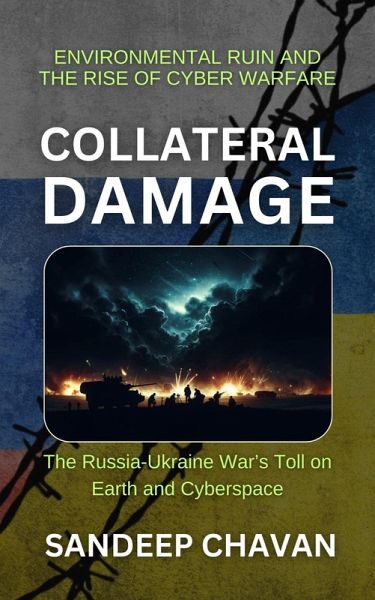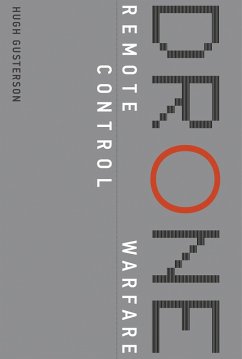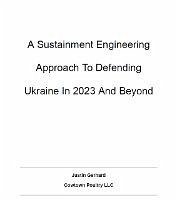
Collateral Damage (Echoes of War: The Russia-Ukraine Conflict and Its Global Ripples, #5) (eBook, ePUB)
Versandkostenfrei!
Sofort per Download lieferbar
13,49 €
inkl. MwSt.
Weitere Ausgaben:

PAYBACK Punkte
0 °P sammeln!
Collateral Damage: The Russia-Ukraine War's Toll on Earth and Cyberspace by Sandeep Chavan explores the profound and far-reaching impacts of modern conflict beyond the battlefield. This comprehensive analysis examines how the Russia-Ukraine war has not only devastated physical landscapes but also reshaped the digital realm, leaving behind a complex legacy of environmental destruction and cybersecurity challenges.The book begins by documenting the environmental toll of the conflict, vividly describing the damage to ecosystems, forests, rivers, and critical infrastructure. It highlights how bomb...
Collateral Damage: The Russia-Ukraine War's Toll on Earth and Cyberspace by Sandeep Chavan explores the profound and far-reaching impacts of modern conflict beyond the battlefield. This comprehensive analysis examines how the Russia-Ukraine war has not only devastated physical landscapes but also reshaped the digital realm, leaving behind a complex legacy of environmental destruction and cybersecurity challenges.
The book begins by documenting the environmental toll of the conflict, vividly describing the damage to ecosystems, forests, rivers, and critical infrastructure. It highlights how bombings, deforestation, and chemical contamination have disrupted biodiversity, polluted water sources, and rendered vast areas uninhabitable. Through case studies, Chavan illustrates the cascading effects of these damages on agriculture, wildlife, and human livelihoods.
In the digital domain, the book uncovers the growing significance of cyber warfare as a weapon of modern conflict. Chavan details the cyberattacks that have crippled Ukraine's critical infrastructure, financial systems, and communication networks, exposing vulnerabilities in interconnected global systems. He also analyzes the use of misinformation, disinformation, and psychological operations, showing how information has become a powerful tool for shaping perceptions and manipulating narratives.
Shifting focus to recovery and resilience, the book explores innovative solutions to address the war's devastating impacts. Chavan highlights the transformative role of advanced technologies, such as AI, IoT, and satellite imagery, in monitoring and mitigating environmental damage. Renewable energy, water purification systems, and reforestation efforts emerge as critical pillars of sustainable rebuilding. He emphasizes the importance of international collaboration and funding to support Ukraine's path toward recovery and its potential leadership in sustainable development.
More than a documentation of destruction, Collateral Damage is a call to action. Chavan underscores the urgency of establishing international norms for cyber and environmental warfare, fostering global cooperation, and promoting ethical practices in conflict management. By weaving together themes of environmental conservation, cybersecurity, and resilience, the book offers a blueprint for addressing the complex challenges of modern warfare.
With compelling insights and actionable solutions, Collateral Damage appeals to policymakers, researchers, and anyone seeking to understand the evolving nature of conflict and the opportunities for recovery and innovation in its aftermath.
The book begins by documenting the environmental toll of the conflict, vividly describing the damage to ecosystems, forests, rivers, and critical infrastructure. It highlights how bombings, deforestation, and chemical contamination have disrupted biodiversity, polluted water sources, and rendered vast areas uninhabitable. Through case studies, Chavan illustrates the cascading effects of these damages on agriculture, wildlife, and human livelihoods.
In the digital domain, the book uncovers the growing significance of cyber warfare as a weapon of modern conflict. Chavan details the cyberattacks that have crippled Ukraine's critical infrastructure, financial systems, and communication networks, exposing vulnerabilities in interconnected global systems. He also analyzes the use of misinformation, disinformation, and psychological operations, showing how information has become a powerful tool for shaping perceptions and manipulating narratives.
Shifting focus to recovery and resilience, the book explores innovative solutions to address the war's devastating impacts. Chavan highlights the transformative role of advanced technologies, such as AI, IoT, and satellite imagery, in monitoring and mitigating environmental damage. Renewable energy, water purification systems, and reforestation efforts emerge as critical pillars of sustainable rebuilding. He emphasizes the importance of international collaboration and funding to support Ukraine's path toward recovery and its potential leadership in sustainable development.
More than a documentation of destruction, Collateral Damage is a call to action. Chavan underscores the urgency of establishing international norms for cyber and environmental warfare, fostering global cooperation, and promoting ethical practices in conflict management. By weaving together themes of environmental conservation, cybersecurity, and resilience, the book offers a blueprint for addressing the complex challenges of modern warfare.
With compelling insights and actionable solutions, Collateral Damage appeals to policymakers, researchers, and anyone seeking to understand the evolving nature of conflict and the opportunities for recovery and innovation in its aftermath.
Dieser Download kann aus rechtlichen Gründen nur mit Rechnungsadresse in A, B, CY, CZ, D, DK, EW, E, FIN, F, GR, H, IRL, I, LT, L, LR, M, NL, PL, P, R, S, SLO, SK ausgeliefert werden.













